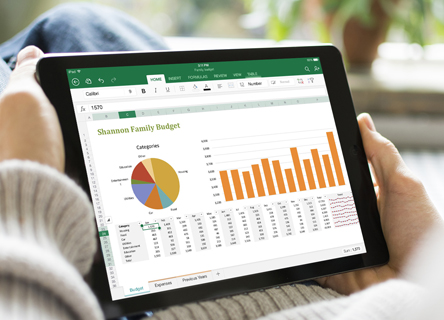The ultra-fast fifth-generation network connection, 5G, is all set to roll out and revolutionize the way the communication industry serves its clientele. The network is expected to be as much as a hundred times faster than its predecessor, taking the data transmission by storm. Industry experts have recently predicted that the technology will spread its reach quickly and engulf the whole market in a blink. Nearly 20% of the entire communication traffic is likely to switch to 5G by 2023.
This groundbreaking technology will transform the landscape and influence every industry vertical from automotive to healthcare. It will help comprehend the power of manifestation allowing you to realize all your technological dreams. With 5G every home could turn into smart homes, every city into a smart city, so on and so forth.
Undoubtedly, we are living in the digital era where colossal datasets are generated every day. We need to effectively process this data to derive actionable insights and leverage its full potential. This brings cloud computing to the game and provides massive storage to keep these datasets. Only the fastest connectivity can ensure drawing full benefits of this continuously growing data.
5G will bring dramatic changes to cloud computing and cloud capacities. As mobiles are replacing laptops and the cloud is becoming more accessible than ever, a superior, low latency, turbo speed network can add new dimensions to it. It opens new gateways for several innovative applications that gear up the way people communicate, collaborate, and connect.
√ What makes 5G the next big thing?
Let us understand a bit about 5G technology and its working before we start scrutinizing its impact. Just like its predecessors, 5G is also based on transmitting and receiving data using radio frequencies. But what makes it superior is the speed it provides for downloading and uploading data. You can expect as much as 20 Gbps down and 10 Gbps up, which is drastically higher than 4G connectivity that provides speed in megabytes.
Apart from the incredibly accelerated data speed, 5G also delivers groundbreaking cut down in latency. It is the time that two devices on the network take to respond to one another. Unlike 100 milliseconds in 3G and 30 milliseconds in 4G, devices can respond in just 1 millisecond using 5G, making the connection almost instantaneous. These capabilities of 5G can shatter many glass ceilings and bring unfathomable potential to cloud computing and cloud applications.
√ Impact of 5G on clouds
It is presently too early to list out all the possible impacts of 5G in cloud computing. The benefits can be definitely elicited only when they are realized. However, even in its infancy, 5G technology is showing remarkable prosperity in the said domain.
The most apparent result of 5G can be seen in connection establishment over clouds. It allows the devices to connect almost instantly and start interacting in a flash by eliminating the latency.
The essence of the cloud is the ability it provides numerous devices to connect and share information through the central storage drive or machine in the cloud. From enterprises over private clouds to people in general over public clouds, the power of connectivity is what makes cloud an authoritative and compelling technology in all areas.
Suppose the scenario where you are sending a large video file to your colleague about to deliver a presentation at some other remote site. Using cloud you can just put the video on the shared drive and wait for it to upload and inform him or her about it. Your colleague can then download the file and access the information. Now imagine. How empowering it would be if you immediately connect with your mate and exchange files at a scintillating speed of 20 Gbps down and 10 Gbps up. A video file as big as 10 gigabytes can be shared in less than ten seconds. Also, this direct transfer liberates you from the additional steps of accessing the online repository.
With the widespread roll-out of 5G, consumption of cloud applications in every sector from healthcare, retail, banking, and beyond will see an unprecedented surge. It will make application development smoother and realize their full potential at early stages and every innovative vision a reality.
Enterprises will be able to reach mobile consumers easily and reliably. It will also revolutionize machine-to-machine interaction. Accessing a virtual machine with your mobile devices such as smart phones and tablets will become a common everyday thing. It will facilitate the remote workers which is not just the need of the hour but also the future of workforce management. Cloud computing providers will be able to delegate more relevant and comforting features to the masses.
√ Gateways 5G opens for cloud computing
The buzz around the 5G capabilities such as turbo speed, latency elimination, etc is all over the world. It is bringing in a new revolution in the new normal that the cloud presents in every industry across the globe. Although a lot is still concealed under the layered capacities of 5G technology, its crucial role in boosting the dominance of clouds in everyday business and lives is already evident.
• Accelerated data and analytics streaming
5G is going to accelerate every industry and the life of every individual it touches. You are going to experience network speed that you have never experienced before. These networks are smartly designed to boost the real-time streaming of multimedia data. Apart from everyday life and regular industries, it will also turn over new leaves for specialized domains. For instance, space bureaus and meteorological departments that rest on time-critical big-data technologies will receive great benefits in terms of efficiency and precision.
• Streamlines cloud-based industrial operations
The streamlined operating character of 5G will bring straight benefits to the industries that rely on clouds to manage their businesses. A reliable and high-speed network will prove a boon for the industries such as supply-chain management and cloud computing security providers that require the exchange of gigantic volumes of sensitive data. Executives will be able to manage the workload by quantifiably scheduling and planning operations and achieve greater efficiency and productivity. Industry operations such as inventory management, order, and delivery tracking, etc will become seamless and effortless and bring renewed agility to the businesses and economies at large.
• Boost in remote working with unprecedented connectivity
The recent pandemic has disrupted businesses across the globe and has given rise to a new normal. Reporting to offices for daily working has become a thing of the past. Now, your workforce can deliver the same if not higher efficiency by working from the comfort of their homes. Cloud applications with 5G connecting your distributed workforce will make this working experience seamless by providing reliable high-speed connectivity. It will help people share significant information in the blink of an eye even while being on the move. Industries can register significant savings in time and resources by 5G empowered cloud applications.
• Enhanced competence of the AI technologies
Although there is still plenty to discover about AI technologies, the innovations it has fueled have been groundbreaking. As the industries are trying to implement AI to mimic human capabilities, the exploding speed of 5G can completely turn the game. It will allow intelligent machines to be operated and controlled remotely with the utmost precision in real-time. The combination of cloud, AI, and 5G will give new dimensions to several critical industries such as healthcare. Similar benefits can be drawn with virtual and augmented reality as well.
• Higher inclination towards hybrid cloud architecture
Often enterprises are bound to invest in complete and private cloud infrastructure and implementation due to security inhibitions. Also, latency in the present networks discourages hybrid cloud adaptation while keeping the data on-premises and operating on clouds. However, the same will become a win-win solution for companies. The near-zero latency will make the operations seamless and efficient while keeping your data safe. It will allow you to leverage the scalability and dynamics of the cloud and also keep full control over your data.
• Rise storage and computing on-demand
5G is set to open new opportunities in storing huge volumes of data on cloud storage. With the present network implementations, nearly 2% of the data generated in a year is stored over clouds. 5G, as per the reports of Huawei's GIV, is likely to boost this storage to 92% by 2025. It will also boost the computing capabilities over the cloud. The amount of data being analyzed and applied would increase up to 80% in the coming five years. As the cloud expands its reach and capacity, 5G is serving as a catalyst to the process.
• Enhanced cloud security
As discussed earlier, 5G will boost the hybrid cloud implementations making the businesses and sensitive government information much safer. It will prevent the cyber attacks and help authorities to recognize threats and defeat the perpetrators.
5G is the booster for cloud computing that has emerged as a savior in the present disruptive crisis. Cloud computing has proven to be the biggest tool for enterprises and organizations to combat stringent lockdowns and social distancing. The combined power of these technologies propels the operational efficiency and fuel the innovation like never before. 5G is the driving force that the world is waiting for and that is soon going to make the technology world more agile and robust.




